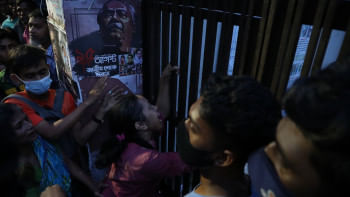Court’s order to sue police for torture commendable

In a country where custodial torture is all too commonplace but redress for such crimes is equally rare, we commend a Natore court for ordering the district superintendent of police to file a case against five policemen for torturing three men in custody. Senior Judicial Magistrate of Lalpur Cognisance Court Md Muslim Uddin issued the order after the three men provided chilling accounts of torture at Lalpur police station when they were produced before the court. The men stated that they were beaten mercilessly on different occasions, and were told to confess to carjacking a three-wheeler.
One of the accused, Sohag, said in his statement that he was beaten, thrashed on the soles of his feet, kicked in the scrotum, and told to confess unless he wanted to be placed on remand. The leg of a table was repeatedly slammed on the little finger of Salam, another accused, and he was beaten with a steel pipe from waist down. Meanwhile, Shamim, the third accused, was thrashed with a piece of bamboo, his legs tied up, and the soles of his feet repeatedly smacked; the cops allegedly also threatened to rub chilli powder on his private parts if he refused to confess to the magistrate. The descriptions of the torture – and the severe injuries sustained in the process – suggest that the unlawful practice is still ubiquitous in the country, and raises serious concerns about the legality or authenticity of confessions obtained in police custody and during remand. They also provide a glimpse into the barbarity which, in worst cases, lead to deaths in custody.
It is truly distressing that the ratification of the 1984 UN Convention against Torture and Other Cruel, Inhuman or Degrading Treatment or Punishment, enactment of the Torture and Custodial Death (Prevention) Act, 2013, and issuance of clear directives by the High Court about the rights of those interrogated in law enforcement custody have all failed to establish accountability mechanisms for excesses by state actors. Those engaging in such practices are hardly ever brought to book – given that the investigations are usually carried out by the offending agencies themselves – providing wholesale impunity to carry out such grievous human rights violations against the citizens of this country.
Against this backdrop, it is worrying that the SP who has been tasked with filing the case has already claimed that the three accused sustained injuries when they fell as they were attempting to run away from police, and that a case will be filed when an investigation is done. But who exactly will conduct the investigation, and how are we to ensure its neutrality? We urge the court to follow up and conduct a judicial inquiry into the matter, if needed. If law enforcement agencies are unwilling to take action against their errant members, the court must intervene to ensure that justice is served.


 For all latest news, follow The Daily Star's Google News channel.
For all latest news, follow The Daily Star's Google News channel. 










Comments